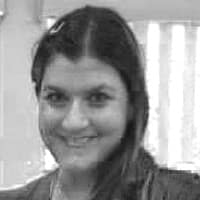Civil Engineering Professor Researches Air Pollution and Microplastics in New Lab

When she was a child, Marwa El-Sayed, Ph.D., remembers feeling frustrated when seeing smog in the air over her home in Cairo, Egypt, or plastic trash strewn on the beach at the Red Sea.
“I knew the problems were there because I was seeing and smelling them,” said El-Sayed. “And I felt like we needed to do something about it.”
Now an assistant professor of civil engineering at Embry-Riddle’s College of Engineering, El-Sayed is working toward that goal, focusing on air pollution and microplastics research in her new Sustainability and Environmental Engineering Lab.
The lab, supported in part by philanthropy, was established in 2020 to measure, monitor and analyze environmental contaminants, with a focus on researching atmospheric pollutants. El-Sayed, who came to Embry-Riddle in 2019, also was awarded funding for her research in 2020 through the university’s FIRST Faculty Internal Awards Program.
Undergraduate students Alexis Smith and Atharv Dangore are working with El-Sayed on microplastics research, collecting and analyzing samples from the atmosphere. They will be partnering with Johns Hopkins to examine the health effects of these microplastics when humans inhale them in the air.
“Microplastics in the atmosphere are tiny, and they can be transported with wind,” El-Sayed said. “We don’t know how they affect us when we inhale them.”
Smith and Dangore presented their research at Embry-Riddle’s Undergraduate Research Student Symposium in 2020 and are presenting in 2021 at the National Conference for Undergraduate Research, as well as the university’s Discovery Day.
“I’m really proud of our lab,” said Smith, a senior civil engineering student with a focus in environmental engineering. “That was our first time presenting, and we won second place – that was really exciting.”
They also presented virtually at the 2021 Air Quality Workshop at the University of Florida, which highlighted research projects dealing with air quality from around Florida.
Studying engineering on three continents, El-Sayed has a wealth of experience to share with her students. She earned a bachelor’s and master’s degrees in chemical engineering from Cairo University, a second master’s degree in sustainable engineering from the University of Cambridge in England and a doctorate in Chemical, Biochemical, and Environmental Engineering from the University of Maryland, Baltimore County.
“Engineering for me is problem solving,” El-Sayed said. “The opportunities and options are endless. You can reach the same point in various ways, especially as engineers.”
In Maryland, she conducted research in air pollution, studying a category of pollutants humans breathe and their impacts. Later, she worked as a postdoctoral fellow at Colorado State University’s Atmospheric Science Department, where she did field studies in Rocky Mountain National Park in Colorado, and the Wildlife Refuge in Montana to investigate air quality.
“The one thing about air is there are no limitations or barriers. Air travels all over, rich and poor countries,” El-Sayed said. “So we need to work collectively because we all share the same free air.”
El-Sayed encourages her students to look holistically at environmental engineering solutions.
“You have to think about the big picture,” she said. “You have to see if the proposed solutions are economically and socially sustainable.”
El-Sayed learned how important that is while working for a few years in Egypt before graduate school. She was advising textile factory owners on how to make their operations cleaner and more environmentally friendly.
“It was hard to change their mentality, especially coming from a young woman. It wasn’t just Egypt – everywhere you go, you face these challenges,” said El-Sayed. “You have to know how to approach people and, in industry, they are mainly focused on profit. So I devised solutions to improve their profit and offer a cleaner option.”
Ultimately, El-Sayed said she hopes to make a positive impact on the environment with her research, and she encourages her students to strive to do the same.
“I like to convey to my students that they shouldn’t fear making a difference,” she said. “They can stand out and be willing to be agents of change.”

 Melanie Stawicki Azam
Melanie Stawicki Azam